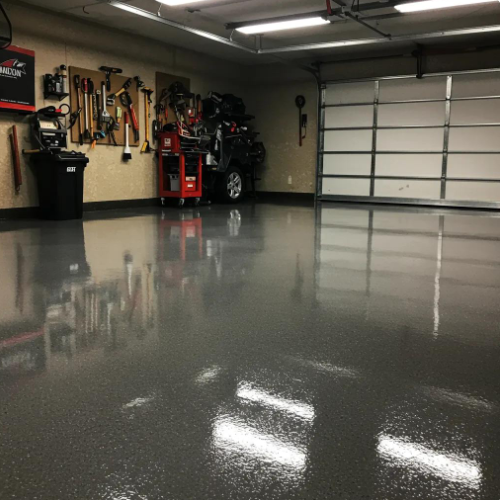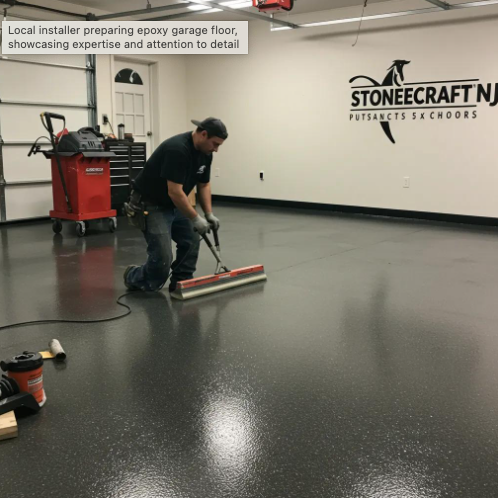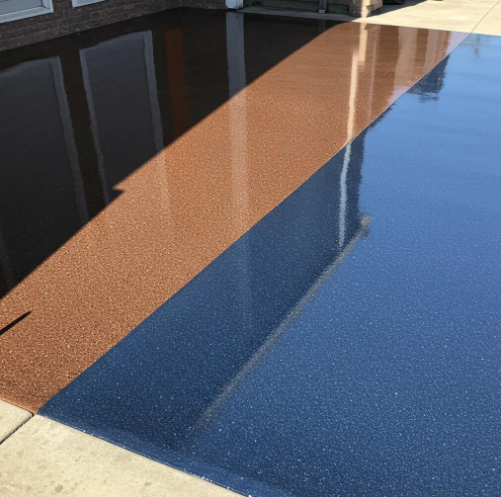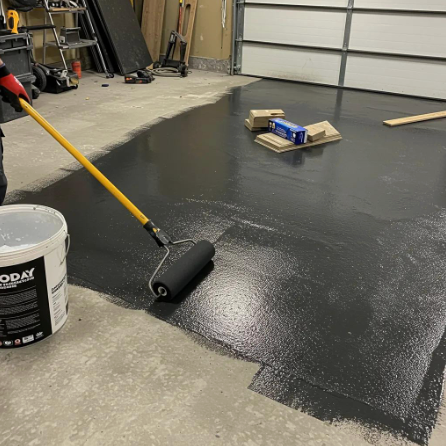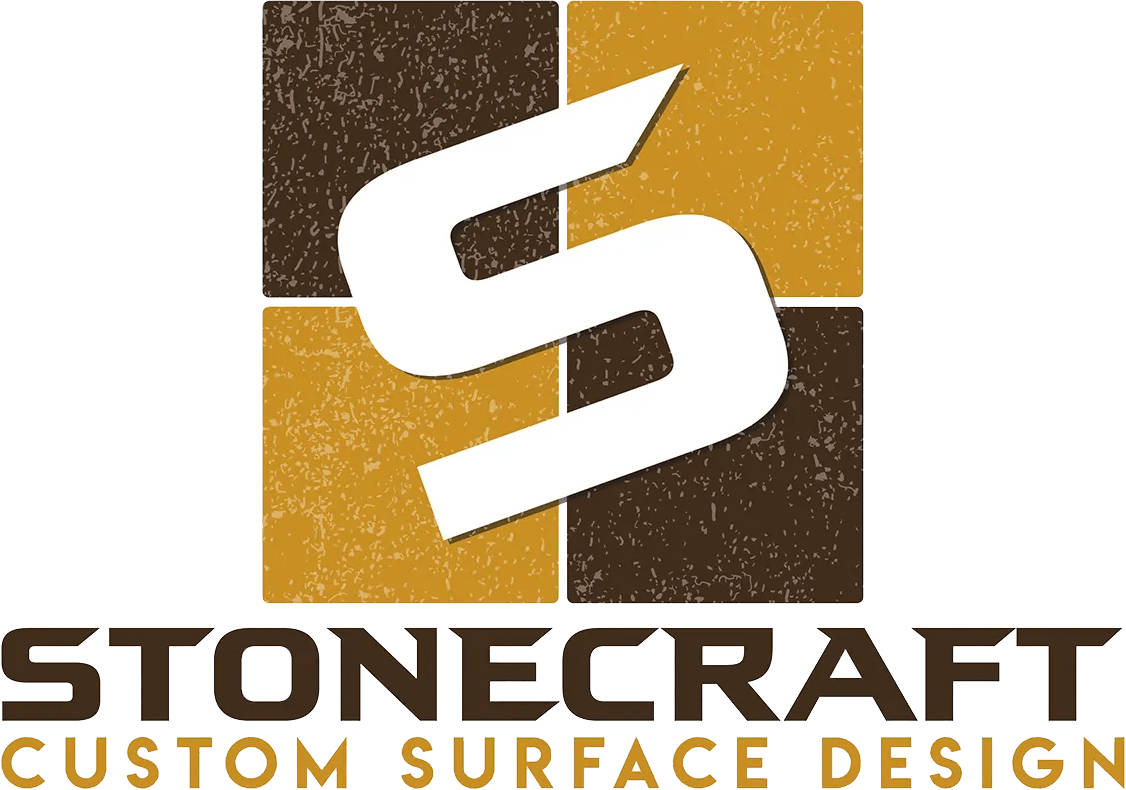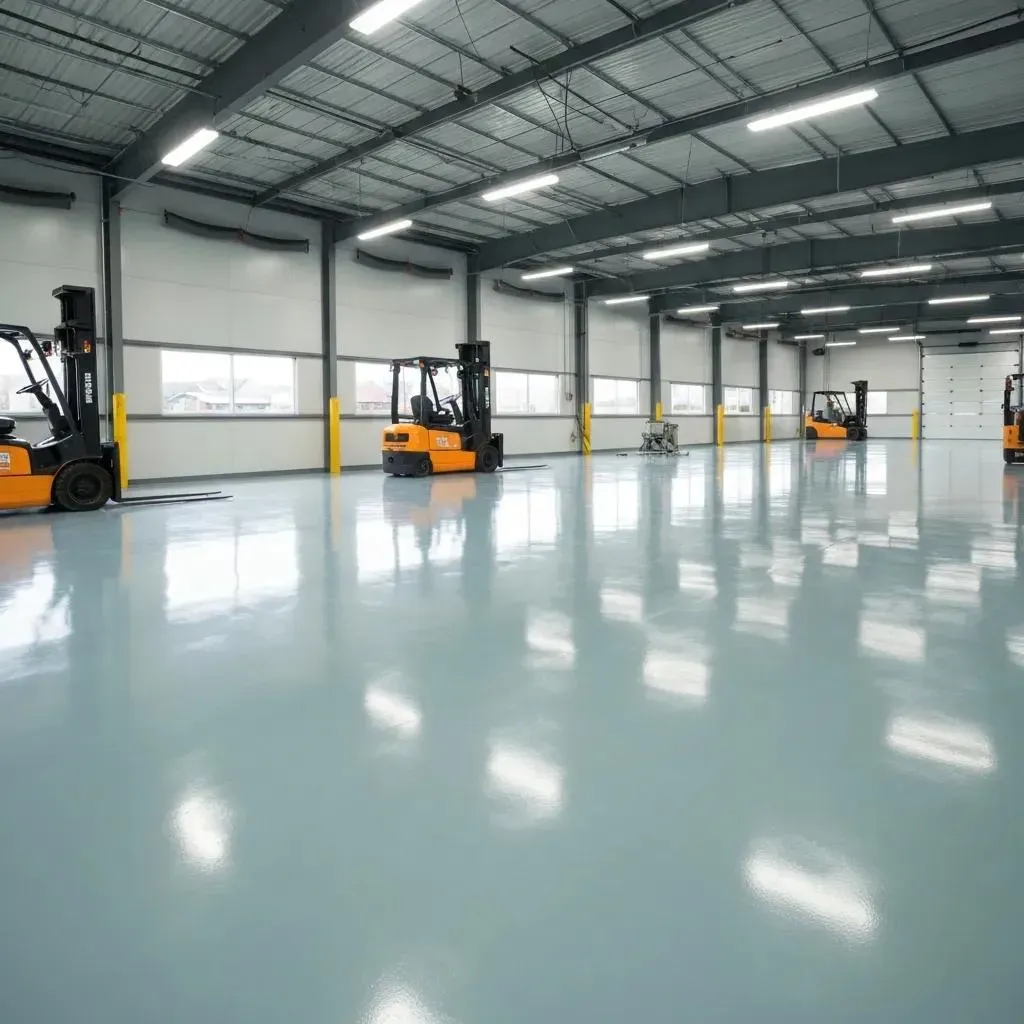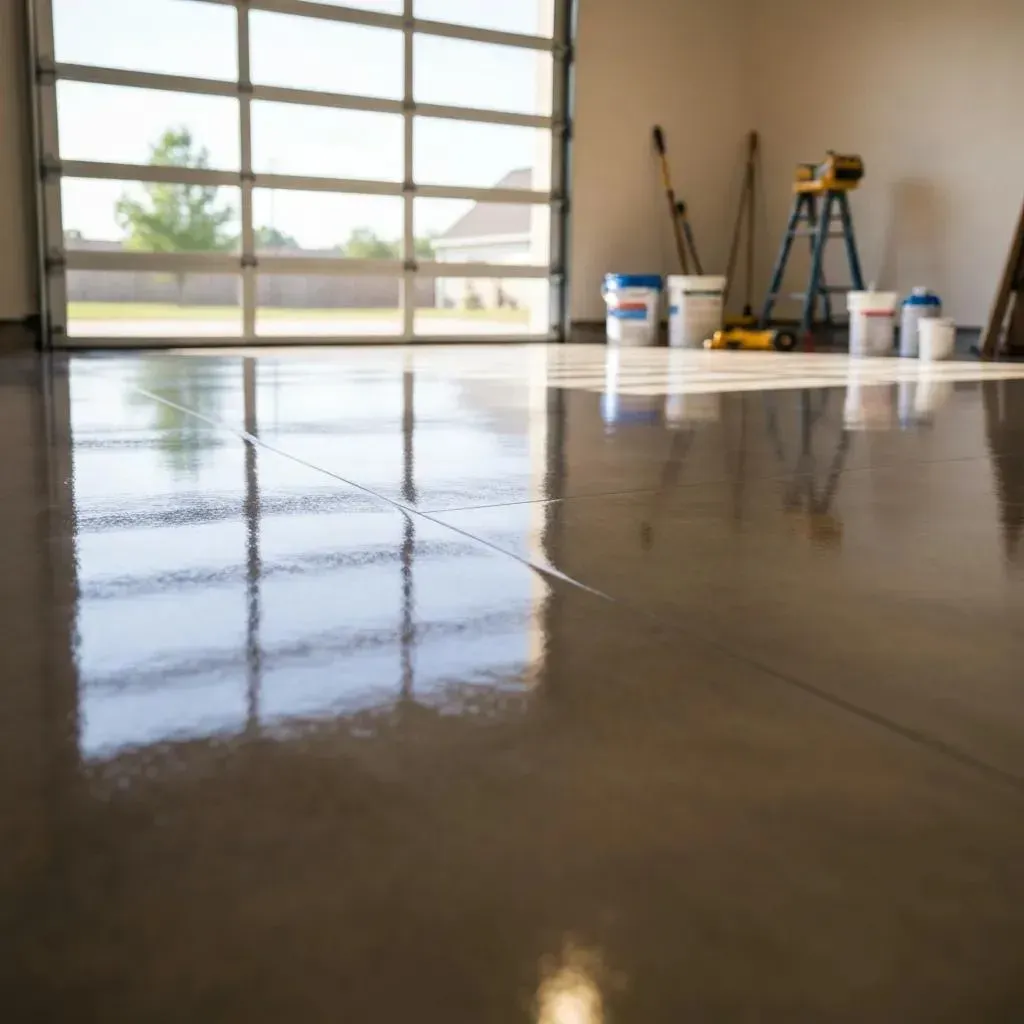By Pinchus Shurkin
•
October 9, 2025
Epoxy Garage Floors in New Jersey : Why Polyaspartic Coatings Last 25 Years Longer A garage floor that resists cracking, chipping, and discoloration for decades can transform your New Jersey home’s functionality and curb appeal. Homeowners seeking durable, low-maintenance surfaces often ask whether epoxy garage floors in New Jersey deliver on their promises—or if an alternative material offers greater longevity. Polyaspartic coatings provide a compelling solution: these advanced aliphatic polyurea systems cure faster, resist UV damage, and outlast epoxy by up to 25 years. In this article, readers will learn what polyaspartic coatings are and how they differ from epoxy ; discover the factors behind their extended lifespan; explore benefits for New Jersey residences; compare installation steps and timelines; evaluate costs and long-term value; review essential maintenance; and find guidance on choosing a trusted local installer. By the end, homeowners will understand why polyaspartic garage floor coatings elevate performance, appearance, and return on investment. What Are Polyaspartic Coatings and How Do They Differ from Epoxy ? Polyaspartic coatings are fast-curing, aliphatic polyurea blends that form a seamless, chemical-resistant layer over concrete . They differ from epoxy in molecular structure and application performance, delivering enhanced flexibility and UV stability. For example, Stonecraft NJ uses polyaspartic systems that complete installation in a single day compared to multi-day schedules required for standard epoxy . Understanding these core material distinctions clarifies why polyaspartic coatings are rapidly gaining popularity in New Jersey . What is a polyaspartic coating ? A polyaspartic coating is a high-performance elastomeric layer created by reacting polyaspartic ester resins with isocyanate hardeners. This reaction produces a cross-linked network that bonds tenaciously to concrete , resisting abrasion and chemical exposure. For instance, typical polyaspartic formulations support automotive fluid resistance, making them ideal for residential garages. The molecular flexibility inherent in these coatings also reduces brittleness, preventing cracks when the substrate moves or thermally expands. How do epoxy and polyaspartic coatings compare in composition? Epoxy consists of bisphenol-A resin combined with amine curing agents, forming rigid, glass-like films. Polyaspartic systems use aliphatic polyurea chemistry that incorporates flexible polyaspartic esters. The following table summarizes key compositional differences. Coating Type Resin Chemistry Flexibility UV Stability Typical Cure Time Epoxy Bisphenol-A / Amine Moderate; can become brittle Prone to yellowing 24–48 hours Polyaspartic Aliphatic polyurea High; retains elasticity Excellent; resists fading 2–4 hours These distinctions explain why polyaspartic finishes remain aesthetically vibrant and structurally sound under New Jersey ’s sun exposure and temperature swings. Why do polyaspartic coatings cure faster than epoxy ? Polyaspartic coatings cure rapidly because their reactive polyaspartic esters cross-link almost immediately upon mixing with isocyanate hardeners. This single-component reaction bypasses the slower amine-based curing process seen in epoxies. Fast cure accelerates return-to-service time, enabling homeowners to park vehicles and resume garage use within hours instead of days. Rapid polymerization also reduces vulnerability to dust contamination during installation, ensuring a flawless finish. Why Do Polyaspartic Coatings Last 25 Years Longer on Garage Floors ? Polyaspartic coatings extend garage floor lifespans through superior abrasion resistance, chemical inertness, and UV stability. These attributes limit micro-damage, fading, and degradation that typically shorten epoxy performance. In New Jersey ’s alternating seasonal humidity and sun exposure, polyaspartic layers maintain integrity far beyond epoxy ’s typical 5–10 year service window. What makes polyaspartic coatings more resistant to wear and tear? Polyaspartic systems feature cross-linked polymer networks with high tensile strength and flexibility. This combination blocks micro-cracking under heavy loads and repeated vehicle traffic. Key durability factors include: High Tensile Strength – Resists gouges and scuffs from tire spin and dropped tools. Elastic Recovery – Accommodates substrate movement without cracking. Abrasion Resistance – Withstands routine sweeping and power washing without thinning. By preventing surface erosion, polyaspartic coatings preserve structural integrity, setting the stage for superior longevity. How do polyaspartic coatings handle New Jersey ’s climate conditions? Polyaspartic formulas accommodate thermal expansion and contraction driven by the state’s hot summers and freezing winters. Their inherent elasticity prevents delamination or micro-fracturing as concrete slabs expand under heat and contract in cold. This weather-adaptive performance reduces crack propagation and edge lifting commonly seen with rigid epoxy coatings, supporting a continuous, protective barrier year-round. What role does UV resistance play in coating lifespan? Polyaspartic esters contain aliphatic segments that naturally block UV energy, preventing resin breakdown and pigmentation shifts. UV resistance is critical for New Jersey garages with open bays or windows where sun exposure can yellow and weaken typical epoxy finishes. By maintaining color fidelity and polymer cohesion, polyaspartic layers extend both visual appeal and functional lifespan. What Are the Benefits of Polyaspartic Garage Floor Coatings in New Jersey Homes? Polyaspartic coatings improve garage floors through enhanced aesthetics , simplified maintenance, and rapid installation convenience. Homeowners gain surfaces that not only look custom but also stand up to oil spills, stains, and everyday wear with minimal upkeep. Decorative flake options and high-gloss finishes elevate curb appeal while the coating ’s low porosity limits dirt infiltration. How do polyaspartic coatings improve garage floor appearance? Polyaspartic systems support decorative chips, metallic pigments, and high-gloss topcoats that create showroom-style floors . These customizable finishes hide imperfections and add depth through multi-layer flake broadcast techniques. An epoxy base can dull over time, but polyaspartic top surfaces retain sheen and color vibrancy under repeated cleaning and UV exposure. Can polyaspartic coatings resist stains and chemicals better than epoxy ? Yes, polyaspartic coatings form a nonporous, chemical-inert barrier that resists automotive fluids, oil, gasoline, and household cleaning agents. Spills bead on the surface and wipe away without penetrating the substrate. In contrast, epoxy ’s moderate chemical resistance can degrade and stain under prolonged contact, requiring more frequent resealing. How does fast curing time benefit New Jersey homeowners? Fast cure means installation completes within a single workday, minimizing disruption. Homeowners avoid multi-day project windows and the inconvenience of relocating vehicles. Rapid return-to-use also reduces exposure to uncontrollable environmental factors like humidity or dust, ensuring a pristine finish that enhances long-term performance. How Does the Installation Process of Polyaspartic Coatings Compare to Epoxy ? Polyaspartic installation accelerates traditional epoxy workflows without compromising surface quality. Both begin with thorough concrete preparation, but polyaspartic ’s rapid chemistry shortens waiting periods between primer , base, and topcoat applications. For a seamless comparison, consider the following standard steps. What are the steps involved in applying polyaspartic coatings? Concrete surfaces must be mechanically profiled and cleaned to ensure adhesion. The installation typically follows these stages: Mechanically diamond-grind or shot-blast the concrete to an ICRI CSP 3–5 profile. Vacuum and degrease the slab with a high-alkaline cleaner. Apply a polyaspartic primer to seal and promote bonding. Broadcast decorative flakes (optional) into a wet base coat . Roll on a polyaspartic topcoat for gloss and protection. These coordinated steps yield a uniform floor that cures quickly and delivers optimal performance. How long does polyaspartic coating installation take? Polyaspartic coatings cure to foot traffic in as little as two to four hours, with full service readiness within 24 hours. In contrast, epoxy systems often require 24–48 hours between coats and up to five days for complete cure. Accelerated polyaspartic timelines let New Jersey homeowners use their garages again by evening of the same day. Are there special preparation requirements for New Jersey garage floors ? Yes, New Jersey ’s variable humidity and potential moisture vapor emissions necessitate moisture testing and mitigation. Polyaspartic coatings bond best on dry, sound concrete with less than 3 lb/1,000 ft²/24 hr moisture vapor transmission. Certified installers perform calcium chloride tests and apply moisture mitigation primers when needed to prevent adhesion failure and blistering. How Much Do Polyaspartic Garage Floor Coatings Cost in New Jersey ? Investing in polyaspartic coatings involves material quality, surface area, decorative choices, and labor complexity. While upfront costs exceed basic epoxy , long-term durability and minimal maintenance deliver superior lifecycle value. Homeowners should weigh initial budget against decades of service without full replacements. What factors influence the cost of polyaspartic coatings? Cost drivers include: Floor Size – Larger areas require more material and labor. Surface Condition – Extensive crack repairs or moisture mitigation add preparation costs. Decorative Options – Specialty flakes, metallic pigments, and custom designs increase material expenses. Coverage Specifications – Higher mil thickness for robust industrial performance raises per-square-foot rates. A detailed proposal from an experienced installer clarifies each factor’s impact on project pricing and value. Is polyaspartic coating more cost-effective over time than epoxy ? Yes, despite higher initial rates, polyaspartic coatings rarely require resealing or full replacement over a 25-year lifespan. Epoxy floors often need recoating every 5–10 years due to abrasion and yellowing. Lifecycle cost analysis shows polyaspartic systems yield lower annual cost when factoring in labor, downtime, and material. Are there financing or warranty options available for New Jersey homeowners? Many flooring specialists offer flexible financing plans and manufacturer-backed warranties. Stonecraft NJ provides limited warranties on polyaspartic installations that cover adhesion and durability for extended periods. Homeowners can request detailed warranty documentation and explore financing to align project costs with budget goals. What Maintenance Is Required to Keep Polyaspartic Garage Floors Lasting 25 Years? Routine care for polyaspartic floors is simple yet critical for preserving performance. Regular cleaning prevents abrasive grit buildup and maintains slip resistance, while prompt spill removal protects the nonporous surface. Periodic inspections catch minor damage before it spreads. How often should polyaspartic floors be cleaned? Weekly sweeping with a soft-bristle broom removes dust and debris. Monthly damp mopping using a microfiber mop keeps the sheen vibrant. High-traffic zones benefit from quarterly machine scrubbing with a gentle pad. Consistent schedules prevent abrasive particles from wearing the topcoat. What products are safe for cleaning polyaspartic coatings? Use pH-neutral cleaners designed for coated concrete to avoid film buildup or dulling. Recommended options include: Diluted dish soap solutions. Commercial floor cleaners marked “safe for urethane/ polyurea .” Water-based neutral-pH detergents. Harsh acids, ammonia, or solvent-based products can degrade the polymer network and are best avoided. How to repair minor damage on polyaspartic garage floors ? Small surface scratches or chips can be addressed by lightly sanding the affected area, cleaning it thoroughly, and applying a thin polyaspartic touch-up coat . For flake broadcasts, matching decorative chips restores visual continuity. Prompt repairs prevent localized wear from undermining the overall coating integrity. Where Can New Jersey Homeowners Find Trusted Polyaspartic Garage Floor Installers? Selecting a qualified installer ensures professional results and maximizes coating longevity. Look for firms with proven track records, clear process documentation, and warranty support. Local references and project galleries offer insight into craftsmanship quality. What should you look for in a professional polyaspartic installer? Choose installers who demonstrate: Certified Training – Manufacturer accreditation in polyaspartic application. Surface Preparation Expertise – Use of mechanical profiling equipment. Detailed Proposals – Transparent breakdown of steps, materials, and warranties. Quality Assurance Practices – Moisture testing and adhesion checks. These criteria build trust that your floor will perform as promised for decades. How to verify installer experience with polyaspartic coatings? Request photographic case studies of completed polyaspartic projects in New Jersey . Inquire about years of hands-on experience and ask for references within your community. Contractors should willingly discuss moisture mitigation methods and long-term performance metrics. Are there local New Jersey reviews or testimonials for polyaspartic floor services? Residents in Lakewood and surrounding areas frequently praise installers for transforming garages into high-functioning spaces. Online reviews highlight on-time completions, cleaner job sites, and enduring finishes. Stonecraft NJ’s clients report consistent satisfaction with durable surfaces and responsive service, reinforcing confidence in professional polyaspartic applications. Garage floors coated with polyaspartic systems in New Jersey deliver unparalleled durability, weather resilience, and aesthetic appeal, outlasting epoxy by decades. Their rapid curing, exceptional chemical resistance, and UV stability make them ideal for residential settings where longevity and low maintenance are priorities. Proper installation by certified professionals, combined with simple upkeep, ensures a seamless, high-performance surface for over 25 years. Homeowners seeking lasting value and modern finishes can explore polyaspartic options offered by trusted local experts to upgrade garage functionality and appearance.
